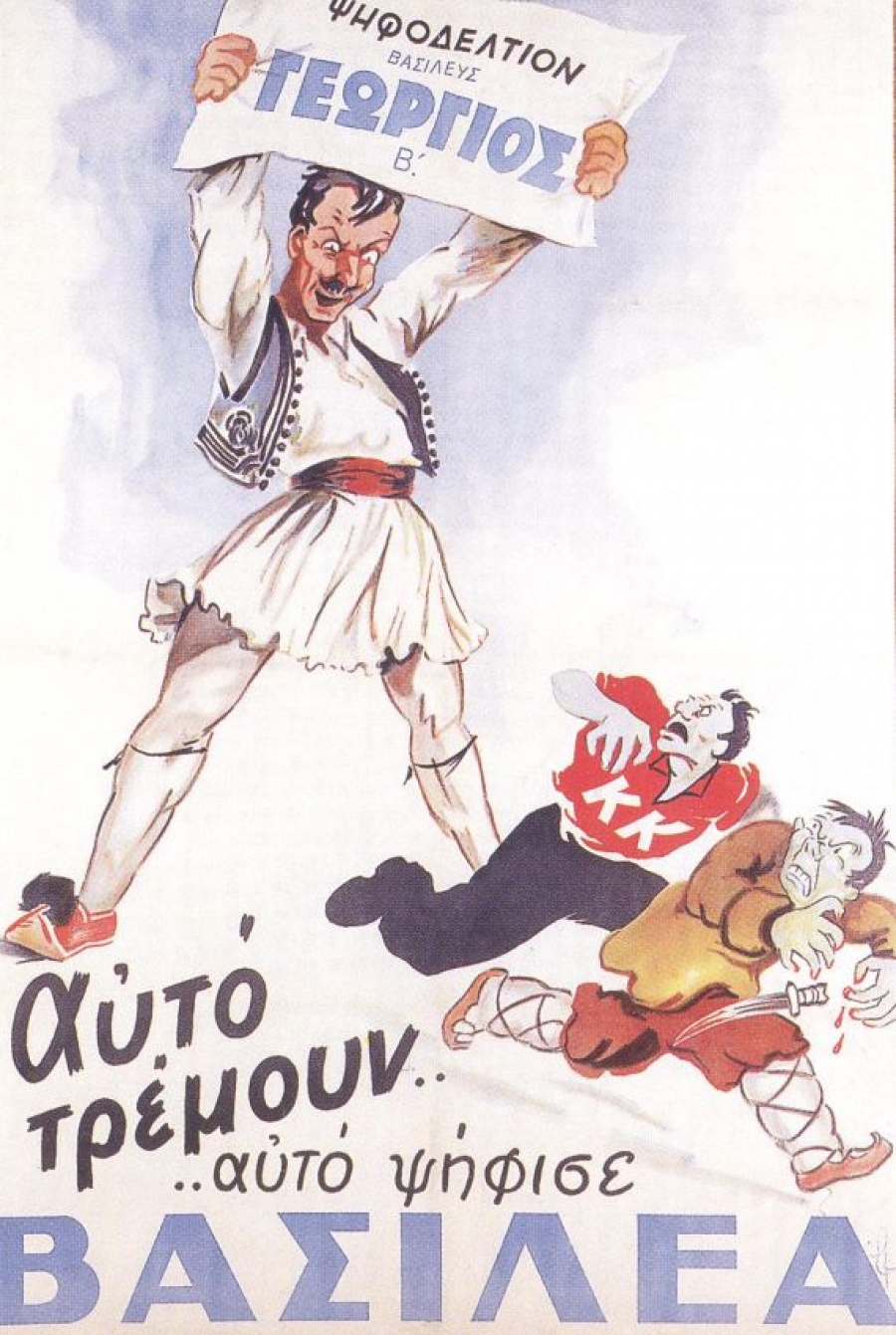1946 Greek Referendum on:
[Wikipedia]
[Google]
[Amazon]
 A referendum on maintaining the monarchy was held in
A referendum on maintaining the monarchy was held in
 A referendum on maintaining the monarchy was held in
A referendum on maintaining the monarchy was held in Greece
Greece, officially the Hellenic Republic, is a country in Southeast Europe. Located on the southern tip of the Balkan peninsula, it shares land borders with Albania to the northwest, North Macedonia and Bulgaria to the north, and Turkey to th ...
on 1 September 1946.Dieter Nohlen
Dieter Nohlen (born 6 November 1939) is a German academic and political scientist. He currently holds the position of Emeritus Professor of Political Science in the Faculty of Economic and Social Sciences of the University of Heidelberg. An ex ...
& Philip Stöver (2010) ''Elections in Europe: A data handbook'', p830 The proposal was approved by 68.4% of voters with a turnout of 88.6%.
Background
The referendum was the fourth since 1920 on the country's monarchy. The 1946 parliamentary elections, in which the right-wing parties achieved a landslide, had just taken place. The new conservative government of Konstantinos Tsaldaris was favorable to George II, but what influenced the result more was the atmosphere of imminentcivil war
A civil war is a war between organized groups within the same Sovereign state, state (or country). The aim of one side may be to take control of the country or a region, to achieve independence for a region, or to change government policies.J ...
.
The civil war convulsed Greece during two main periods: first between 1943 and 1944 between the KKE-dominated EAM/ ELAS partisans and the right-wing
Right-wing politics is the range of political ideologies that view certain social orders and hierarchies as inevitable, natural, normal, or desirable, typically supporting this position based on natural law, economics, authority, property ...
resistance groups and the internationally recognized Greek government-in-exile which had returned to the country in November 1944 and later in 1946–1949. The collaborationist government collapsed after the Germans had left, and all of its leaders were in custody. EAM/ELAS, which controlled much of the countryside, expected to take over until it realized that Stalin
Joseph Vissarionovich Stalin (born Dzhugashvili; 5 March 1953) was a Soviet politician and revolutionary who led the Soviet Union from 1924 until Death and state funeral of Joseph Stalin, his death in 1953. He held power as General Secret ...
had conceded Greece to the British at Yalta
Yalta (: ) is a resort town, resort city on the south coast of the Crimean Peninsula surrounded by the Black Sea. It serves as the administrative center of Yalta Municipality, one of the regions within Crimea. Yalta, along with the rest of Crime ...
. It believed that it was essential to seize control of the capital and to create "facts on the ground." EAM/ELAS heavily outnumbered and outgunned government forces and came within a hair's breadth of success. Churchill moved quickly to transfer two British divisions from Italy, and after a month of fighting, they decisively defeated the Greek communists.
The referendum took place, after EAM/ELAS had been defeated in the ''Dekemvriana
The ''Dekemvriana'' (, "December events") refers to a series of clashes fought during World War II in Athens from 3 December 1944 to 11 January 1945. The conflict was the culmination of months of tension between the left-wing National Liberatio ...
''. Although it had agreed to disarm at the Treaty of Varkiza, in January 1945, it surrendered only a few token weapons and withdrew into the mountainous areas of Greece, where it had effective control. In retaliation for the Red Terror
The Red Terror () was a campaign of political repression and Mass killing, executions in Russian Soviet Federative Socialist Republic, Soviet Russia which was carried out by the Bolsheviks, chiefly through the Cheka, the Bolshevik secret police ...
, right-wing groups, often with the tacit support of the security forces, persecuted communists in areas not under communist control, the White Terror. This deepened the gulf between the left-wing and the centrist and right-wing parties and polarised the political spectrum so that the centrist parties, which followed a more moderate but also a more ambiguous policy, lost part of their power.
The KKE boycotted both the elections and the referendum and instead launched the second phase of the civil war. It prevented any voting in areas that it controlled. George II symbolized the unity of the anti-communist forces, which partly explains the percentage of votes in his favour. The conservatives, along with Prime Minister Konstantinos Tsaldaris, supported him, but the centrists were divided. The centrists regarded George II with displeasure but reacted with disgust at the savagery of the communists.
The official report of the Allied Mission to Observe the Greek Elections MFOGEacknowledged the existence of voter fraud despite its vested interest in legitimising the election: "There is no doubt in our minds that the party representing the government view exercised undue influence in securing votes in support of the return of the King". It, however, claimed that without the said influence, the monarchy would still have prevailed in the election.
Results
References
{{Greek Civil War Referendums in Greece 1946 referendums 1946 in Greece Greek Civil War Monarchism in Greece 1940s in Greek politics Monarchy referendums September 1946 in Europe